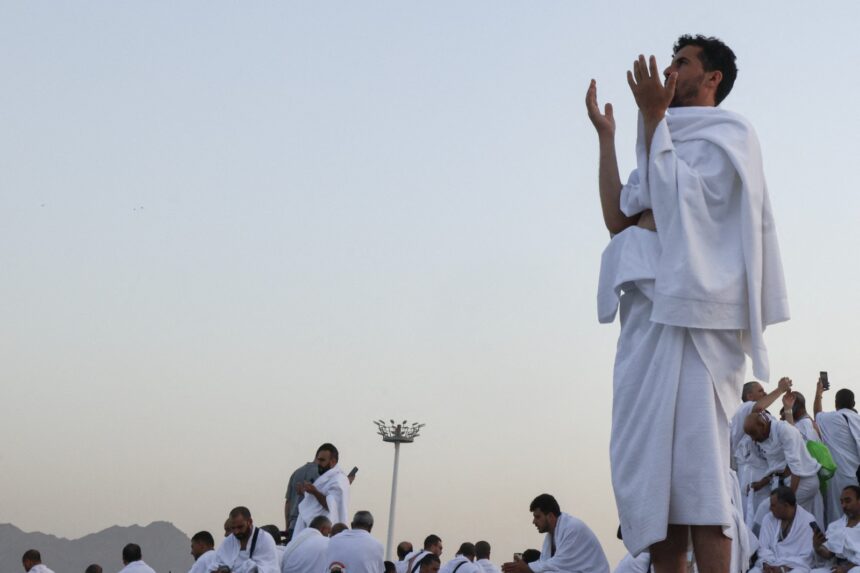MOUNT ARAFAT, MAKKAH: Millions of pilgrims from across the globe converged on Mount Arafat for the pivotal Hajj sermon, where Sheikh Dr. Saleh bin Abdullah bin Humaid, Imam of the Grand Mosque, delivered a powerful message emphasizing taqwa (God-consciousness), unity among Muslims, and unwavering support for the people of Palestine.
Imam of the Grand Mosque, Sheikh Dr. Saleh bin Abdullah bin Humaid, delivered the Hajj sermon for 2025 at Masjid Namirah in the plain of Arafat.
In his comprehensive sermon, he addressed the core beliefs of Islam, acts of worship, ethics, and social responsibilities, calling upon Muslims to embrace piety (taqwa), patience, gratitude, and consistent worship of Allah.He warned against innovations in religion (bid’ah), gossip (gheebah), and falling prey to satanic whispers.Sheikh Dr. Humaid emphasized the importance of the fundamental pillars of Islam, including prayer (salah), fasting (sawm), charity (zakat), and pilgrimage (Hajj).
Zakat, he said, is a means to support the poor and fulfill their needs.Sheikh Dr. Saleh bin Abdullah bin Humaid urged kindness toward parents, orphans, the needy, and neighbors. He reminded Muslims to honor their promises, speak the truth, and uphold modesty, describing these as integral components of faith. He emphasized that good and evil are not equal, and that responding to wrongs with good can transform enemies into close companions.
He warned against innovations in religion (bid’ah), gossip (gheebah), and falling prey to satanic whispers.The imam explained that prayer is the connection between a believer and Allah and that congregational prayer fosters harmony and love within society.
The Imam declared that worship is due to Allah alone, and no prophet or saint is worthy of worship. He stated that Allah sent the Prophet Muhammad ﷺ as a mercy to mankind, and his coming was foretold in earlier scriptures. Belief in all prophets is a fundamental part of Islamic faith.
He called on Muslims to adopt taqwa (God-consciousness), to fear Allah, and to turn to Him in supplication, noting that Allah is with those who are patient. He said salvation and success in this life and the Hereafter depend on faith, and taqwa brings goodness both in this world and the next.
Sheikh Dr. Humaid made a heartfelt dua (supplication): “O Allah, grant our leaders guidance and help them against their enemies and Yours. Feed their hungry, shelter them from the evil of their foes. O Allah, support our brothers in Palestine. Grant us patience, gratitude, and sincerity in worship.”
He also expressed gratitude to the Saudi government for its efforts in facilitating the pilgrimage and caring for the pilgrims.
He reminded listeners that Hajj is a powerful reminder of the Hereafter.Sheikh Dr Humaid emphasized that Allah has completed the religion on this day and chosen Islam as the way of life for humanity.
Annual Hajj pilgrimage The annual Hajj pilgrimage has officially begun, with nearly two million pilgrims settling in the vast tent city of Mina.
Hajj, one of Islam’s five pillars, draws millions of Muslims from around the world every year, fulfilling a once-in-a-lifetime spiritual journey for those people who could afford them.
The air in Makkah echoes with the powerful chants of Labbaik Allahumma Labbaik as pilgrims commence the sacred journey.
A total of 88,301 Pakistani pilgrims are participating under the government scheme, while another 27,012 are performing Hajj through private operators. Pilgrims from Pakistan have been transported to Mina via buses from residential areas including Aziziyah, Naseem, and Batha Quraish.
After donning the ihram and offering two rakats of prayer, the pilgrims made their intention for Hajj and departed for Mina. On the morning of 9th Dhul-Hijjah, they will proceed to the plains of Arafat for the most significant rite of Hajj Wuquf-e-Arafat (Standing at Arafat).
Following the Hajj sermon on the 9th of Dhul-Hijjah, pilgrims will offer combined Zuhr and Asr prayers and remain at Arafat until sunset.
Without performing Maghrib prayer in Arafat, they will then head to Muzdalifah, where they will combine Maghrib and Isha prayers and spend the night under the open sky.
While in Muzdalifah, pilgrims will collect pebbles for the symbolic stoning of the devil. On the morning of 10th Dhul-Hijjah, they will proceed for Ramy al-Jamarat (stoning of the large devil) by throwing seven pebbles. Sacrificial rituals will follow, and male pilgrims will shave their heads (halq) while female pilgrims will trim their hair, signifying the completion of Ihram. On 11th Dhul-Hijjah, pilgrims will stone all three devils the small, medium, and large with seven pebbles each. After the Ramy, they will head to the Holy Kaaba for the Tawaf al-Ziyarah (Farewell Tawaf), followed by the Sa’i ritual between Safa and Marwah.
The stoning ritual continues on 12th Dhul-Hijjah, after midday. Pilgrims may choose to return to their accommodations in Makkah on the 12th or extend their stay in Mina to complete the ritual on the 13th Dhul-Hijjah.
Chanting “Labbaik Allahumma Labbaik” (“Here I am, O God, here I am answering Your call”), more than 1.5 million pilgrims from around the world gathered in Mina on Wednesday, marking the official beginning of Hajj with the Day of Tarwiyah.
Pilgrims began arriving in the early hours of the day, with the Saudi authorities executing a flawless operational plan to ensure smooth and secure transportation. By Wednesday afternoon, the movement of pilgrims into the vast tent city of Mina was completed successfully. Over 8,000 buses transported worshippers from Makkah to Mina in an atmosphere filled with spirituality and devotion.
This year, more than 1.47 million international pilgrims are participating in the annual pilgrimage, joined by hundreds of thousands of domestic pilgrims. Among them are 2,443 pilgrims from 100 countries, hosted as guests of the Custodian of the Two Holy Mosques, King Salman.
Upon arrival in Makkah on Tuesday, pilgrims performed Tawaf Al-Qudum (the Tawaf of Arrival), one of the essential rites of Hajj, before heading to Mina. The valley reverberated with the pilgrims’ recitation of the Talbiyah, creating an atmosphere of unity and deep religious commitment.
Retracing the noble tradition of the Prophet Muhammad (peace be upon him), pilgrims will spend the night in Mina in prayer and reflection, preparing for the pivotal rite of Wuquf (Standing) at Arafat on Thursday—considered the most significant pillar of Hajj.
Saudi authorities, in collaboration with Hajj missions from around the world, have mobilized more than 40 government agencies and deployed 250,000 personnel to manage the pilgrimage. Artificial intelligence and drone technology are being used extensively to monitor crowds and streamline services.
Grand Mufti Sheikh Abdulaziz Al-Sheikh, head of the Council of Senior Scholars, received visitors at his Mina residence on Wednesday and appointed five scholars to issue religious guidance during Hajj. Sheikh Abdulrahman Al-Sudais, head of Religious Affairs at the Grand Mosque and the Prophet’s Mosque, urged pilgrims to continue reciting the Talbiyah until they begin the stoning ritual at Jamarat Al-Aqaba on the 10th of Dhul Hijjah.
Pilgrims have also been urged to pray on time and follow the prescribed format of shortening but not combining prayers, with the exception of Maghrib and Fajr, which should be performed in full.
Hajj, one of the five pillars of Islam, spans five to six days and remains one of the largest annual religious gatherings in the world














